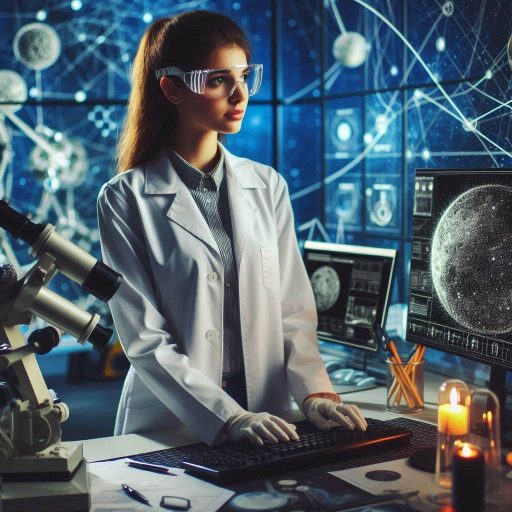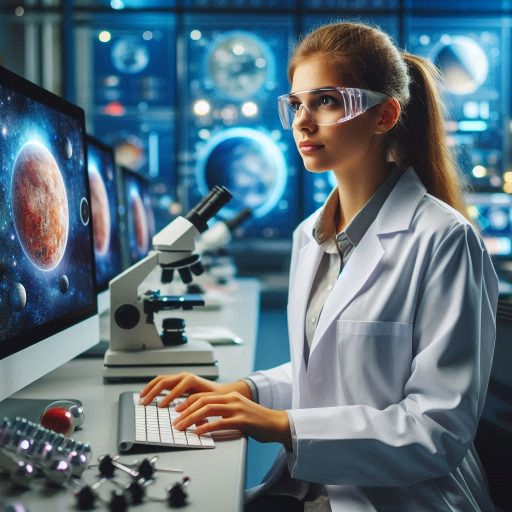Introduction
Women have made significant contributions to space science throughout history, often overcoming substantial barriers.
Their roles have evolved from hidden figures to prominent leaders in the field.
Pioneers like Marie Curie, the first woman to win a Nobel Prize, laid the groundwork for future scientific advancements.
Valentina Tereshkova became the first woman to fly in space in 1963, paving the way for female astronauts.
Sally Ride followed as the first American woman in space in 1983, inspiring countless girls to dream big.
Highlighting women‘s achievements in space science is crucial for many reasons.
It recognizes their vital contributions and inspires future generations.
Celebrating these milestones encourages young girls to pursue careers in STEM fields and promotes gender equity in a traditionally male-dominated arena.
Breaking barriers in space science is essential for continued innovation.
Women today are at the forefront of exciting discoveries and advancements, playing critical roles in missions to Mars, the International Space Station, and beyond.
Their achievements exemplify resilience, dedication, and the power of diverse perspectives.
The future of space science relies on embracing diversity and empowering all voices, enriching creativity and problem-solving in this vital field.
Ultimately, this approach benefits humanity as a whole.
Pioneering Women in Space Science
The Achievements of Women Like Valentina Tereshkova, the First Woman in Space
While Tereshkova‘s accomplishments are commendable, the challenges she faced were immense.
The space industry has long been male-dominated, creating significant barriers for women.
Many female astronauts encountered skepticism regarding their abilities.
Critics often questioned their physical and mental capabilities.
Women had to fight against stereotypes that labeled them as unfit for rigorous training.
They often had to prove themselves time and again.
Women have made remarkable strides in space science, often in the face of daunting challenges.
Valentina Tereshkova, the first woman in space, serves as a powerful symbol of this progress.
Her historic flight aboard Vostok 6 on June 16, 1963, changed perceptions about women in science and engineering.
Tereshkova spent nearly three days in orbit, completing 48 orbits around Earth.
She showcased that women could excel in roles once deemed impossible for them.
Tereshkova‘s achievement opened doors for future generations of female astronauts.
Her journey inspired women worldwide to pursue careers in science, technology, engineering, and mathematics (STEM).
She became a prominent advocate for women’s rights and education.
Tereshkova’s achievements remain a source of inspiration and a reminder of the potential women possess.
Throughout history, women in space science have faced several obstacles, including limited opportunities, gender bias, work-life balance, and lack of representation.
Early space programs offered few positions for women, restricting their participation.
Women often endured bias from male colleagues and superiors, undermining their contributions.
Female scientists and astronauts frequently struggled to balance career aspirations with family responsibilities.
The absence of female role models made it difficult for aspiring women to envision themselves in the field.
The Challenges These Women Faced in a Male-Dominated Industry
Despite these challenges, women continued to break barriers.
Sally Ride, the first American woman in space, launched on the Space Shuttle Challenger in 1983.
Mae Jemison followed as the first African American woman in space in 1992, marking another milestone in representation.
These women faced similar obstacles as Tereshkova but persevered and succeeded.
The achievements of women in space science demonstrate their resilience and determination.
They challenge societal norms and inspire future generations to pursue their dreams.
Organizations now recognize the importance of diversity in the space industry.
Many advocate for more inclusive practices that empower women.
The accomplishments of women like Valentina Tereshkova highlight their vital role in space science.
Despite facing numerous challenges in a male-dominated industry, these women have paved the way for future explorers.
By breaking barriers, they have proven that women can achieve greatness in any field.
The future of space science is brighter with their voices and talents leading the way.
Read: How Climate Change Is Impacting Plant Research
Current Women in Space Science
Profiles of Influential Women in the Field Today
Mae Jemison: A Trailblazer
Mae Jemison became the first African American woman in space in 1992.
She flew aboard the Space Shuttle Endeavour on mission STS-47.
Jemison‘s journey was historic and transformative.
Jemison is not only an astronaut but also a physician and engineer.
After earning her medical degree from Cornell University, she worked as a general practitioner.
Her diverse background in medicine and engineering helped shape her approach to space science.
During her mission, Jemison conducted experiments focused on life sciences and materials.
She studied how microgravity affects various biological and physical processes.
Her research contributed significantly to our understanding of space environments.
Beyond her spaceflight, Jemison advocates for science education and diversity in STEM fields.
She founded the Jemison Group, a consulting firm promoting technology and human advancement.
Jemison‘s impact extends far beyond her flight; she continues to inspire future generations of scientists.
Sally Ride: A Pioneering Astronaut
Sally Ride made history as the first American woman in space in 1983.
She flew aboard the Space Shuttle Challenger on mission STS-7.
Ride‘s journey marked a significant milestone for women in space exploration.
Before becoming an astronaut, Ride earned a Ph.D. in physics from Stanford University.
Her expertise in physics and engineering made her a valuable asset to NASA.
During her missions, Ride helped deploy satellites and conduct scientific experiments.
Ride‘s contributions to space exploration extend beyond her time in orbit.
She played a key role in developing the Space Shuttle program and training new astronauts.
Her leadership and dedication shaped NASA‘s future missions.
After leaving NASA, Ride dedicated herself to education and outreach.
She founded Sally Ride Science, an organization that encourages young girls to pursue STEM careers.
Through her work, she inspires countless students to break barriers in science and technology.
Their Contributions to Space Exploration and Scientific Advancements
Mae Jemison and Sally Ride exemplify the power of women in space science.
Their contributions have significantly advanced our understanding of space exploration.
They have paved the way for future generations of women in STEM fields.
Highlighting their achievements encourages young girls to follow their dreams.
It shows that barriers can be broken with determination and hard work.
The journeys of Jemison and Ride demonstrate the importance of diversity in space science.
Their legacies continue to inspire and empower women to reach for the stars.
As we look to the future, we must continue to celebrate and support women in space science.
Their impact is crucial for advancing exploration and innovation.
Read: Exploring the Different Branches of Geology
Challenges Faced by Women in Space Science
Gender Discrimination and Bias in the Field
Gender discrimination and bias have long plagued the field of space science.
Women often face stereotypes that undermine their capabilities.
These biases manifest in various ways, creating obstacles for female scientists and engineers.
For instance, women frequently encounter assumptions that they lack technical skills.
Such assumptions can lead to exclusion from important projects or leadership roles.
Research shows that women in STEM fields often receive fewer opportunities for advancement.
Studies reveal that women apply for promotions only when they meet 100% of the qualifications.
In contrast, men tend to apply when they meet just 60% of the criteria.
This discrepancy highlights how women internalize bias and doubt their abilities.
Moreover, the culture in many space science organizations remains male-dominated.
This culture often discourages women from fully participating in discussions.
Women report feeling isolated or ignored during team meetings.
This isolation can further limit their opportunities to contribute and advance.
Sexual harassment also poses a significant challenge.
Many women in space science report experiences of harassment, creating an unwelcoming environment.
Such incidents not only affect their morale but also drive some women to leave the field.
Addressing these issues is essential for fostering a supportive and inclusive atmosphere.
Lack of Opportunities for Women to Excel
The lack of opportunities for women in space science significantly impacts their career progression.
Women often have less access to mentorship and networking opportunities.
This absence of support can hinder their professional growth and visibility in the field.
Female scientists may struggle to find mentors who can guide them through career challenges.
Furthermore, the limited representation of women in leadership roles exacerbates the problem.
When women do not see others like them in senior positions, it becomes challenging to envision their own paths.
This lack of representation can discourage young women from pursuing careers in space science.
Organizations that do not prioritize diversity fail to attract and retain talented women.
When women feel undervalued or marginalized, they are more likely to leave.
Consequently, the field loses diverse perspectives and innovative ideas that women bring.
This loss hampers progress in space science and exploration.
To address these issues, organizations must actively promote gender equality.
They should implement policies that ensure equal opportunities for all employees.
Creating mentorship programs can provide essential support for women seeking to advance their careers.
Additionally, promoting a culture of inclusivity will help retain women in the field.
Encouraging women to pursue careers in space science requires systemic change.
Breaking down biases and stereotypes will empower women to excel.
By fostering an environment that celebrates diversity, we can unlock the full potential of the field.
Women play a critical role in advancing space science, and their contributions should be recognized and valued.
Ultimately, supporting women will benefit not just individuals but the entire field of space exploration.
Read: Top Skills Needed for a Successful Geology Career

Initiatives to Support Women in Space Science
Organizations and Programs that Aim to Empower and Mentor Women in the Field
Organizations like Women in Aerospace provide professional development, networking events, and scholarships, connecting women in the aerospace sector and encouraging collaboration.
The Space Generation Advisory Council empowers students and young professionals by organizing events and initiatives that focus on education and career growth.
NASA‘s Women of Color Program supports women of color in STEM by providing mentorship, resources, and professional development opportunities.
Girls Who Code inspires young girls to pursue careers in technology and science through workshops and mentorship.
These organizations play a crucial role in encouraging women to enter and excel in space science.
The Importance of Creating a Supportive Environment for Women in Space Science
Creating a supportive environment for women in space science is essential.
A welcoming atmosphere fosters growth, creativity, and innovation, which are crucial for success.
Supportive environments contribute significantly to mentorship.
Having mentors provides guidance and encouragement, helping women navigate challenges and develop their skills.
Networking with peers fosters collaboration and support while opening doors to new opportunities.
Access to training programs and resources enhances skills and knowledge, enabling women to make meaningful contributions to the field.
Prioritizing work-life balance allows women to manage personal and professional responsibilities more effectively.
Organizations that focus on this balance create healthier work environments.
Visibility also plays a vital role in empowering women in space science.
Celebrating women‘s achievements raises awareness about their contributions and inspires future generations to pursue careers in the field.
Highlighting successful women helps to dismantle stereotypes and encourages young girls to dream big.
Empowering women in space science ultimately benefits everyone.
Diverse teams drive innovation and creativity.
Including women in decision-making processes leads to better solutions and ideas.
As organizations continue to promote inclusivity, they pave the way for future advancements in space exploration.
The push for gender equity in space science is gaining momentum.
As more women join the field, they inspire others to follow in their footsteps.
Programs that empower women create a ripple effect, fostering future generations of female scientists and engineers.
In essence, organizations and programs dedicated to mentoring and supporting women in space science play a vital role.
Read: The Future of Botany: Emerging Fields and Innovations
Delve into the Subject: Exploring Careers in Plant Biotechnology
Breaking Barriers in Space Science
The Progress That Has Been Made in Recent Years in Terms of Gender Equality in the Field
Recent years have marked significant progress in gender equality within space science.
Organizations and institutions increasingly prioritize diversity and inclusion.
Many initiatives support women in pursuing careers in STEM fields.
These efforts aim to create equal opportunities for women in space science.
Many programs focus on empowering young girls.
They provide mentorship, scholarships, and hands-on experience in scientific fields.
This support has led to an increase in female students enrolling in STEM courses.
As a result, women are better represented in space science than ever before.
In addition to educational initiatives, various space agencies have implemented policies promoting gender equity.
For example, NASA’s commitment to diversity has led to greater representation of women in leadership roles.
Their efforts highlight the importance of diverse perspectives in shaping the future of space exploration.
Success Stories of Women Who Have Overcome Challenges and Achieved Significant Milestones
The success stories of women in space science inspire future generations.
These women have faced challenges but achieved remarkable milestones.
One notable figure is Jessica Meir.
Meir participated in the first all-female spacewalk in October 2019.
She overcame significant obstacles to become an astronaut and marine biologist.
Her journey motivates young women to pursue careers in science.
Another inspiring figure is Dr. Swati Mohan.
She played a key role in NASA’s Mars 2020 mission.
Mohan served as the guidance and controls operations lead during the Perseverance rover’s landing.
Her expertise and leadership exemplify women’s contributions to space exploration.
She actively advocates for greater representation of women in STEM.
Dr. Jeanette Epps is also making waves in space science.
She is scheduled to become the first African American woman to live and work on the International Space Station.
Her journey from an aerospace engineer to an astronaut demonstrates the power of perseverance and determination.
Epps‘s story encourages other women to pursue careers in space science.
Furthermore, women are increasingly taking on leadership roles in space agencies.
For instance, NASA’s former Deputy Administrator, Dr. Dava Newman, has championed initiatives to increase diversity.
She emphasized the importance of women’s perspectives in shaping future space missions.
These efforts have created a more inclusive environment within NASA.
The progress in gender equality in space science is undeniable.
Women are making significant contributions and breaking barriers.
Their success stories serve as powerful examples for young girls and aspiring scientists.
By continuing to support and empower women in space science, we can ensure a diverse and innovative future.
The journey toward equality is ongoing, but the achievements of women in this field inspire hope and change.
Together, we can create a more inclusive and equitable environment for all in space science.
The Future of Women in Space Science
Predictions for the Future of Women in the Field
The future of women in space science looks bright.
As societal norms shift, women will continue to break barriers.
More women will take leadership roles in space exploration and research.
Increased visibility of female scientists inspires young girls.
They will see that their dreams are achievable.
In the coming years, we can expect several trends.
More educational programs will focus on girls in STEM.
Schools will emphasize hands-on learning experiences.
Organizations will develop mentorship programs connecting young girls with women in the field.
These initiatives will foster confidence and competence in aspiring scientists.
Advancements in technology will also create opportunities.
The rise of private space companies will increase demand for diverse talent.
Women will be at the forefront of innovative solutions.
Their unique perspectives will drive progress in space exploration.
Women will participate in missions to the Moon and Mars, contributing to groundbreaking research.
Global collaboration will play a crucial role in the future.
International space agencies will prioritize gender equality in their missions.
They will actively seek women scientists for critical roles.
This collaboration will lead to a richer understanding of our universe.
The Importance of Encouraging Young Girls to Pursue Careers in Space Science
Encouraging young girls to pursue careers in space science is essential.
Early exposure to STEM subjects can ignite passion and curiosity.
Parents and educators should actively promote science and mathematics.
They can introduce girls to inspiring role models and mentors.
Creating inclusive environments in schools is vital.
Teachers should foster curiosity and creativity in all students.
Engaging classroom activities can spark interest in space science.
Field trips to science centers or planetariums can provide hands-on experiences.
Community outreach programs can also make a difference.
Workshops and summer camps focused on space science can captivate young minds.
These programs should highlight the contributions of women in the field.
This representation reinforces that girls can succeed in STEM.
Mentorship plays a critical role in shaping young girls‘ futures.
Connecting them with female scientists can provide guidance and support.
Mentors can share their experiences and help navigate challenges.
They can encourage girls to pursue advanced degrees in STEM.
Social media platforms can also amplify female voices.
Sharing stories of women in space science will inspire others.
Online communities can connect girls with role models.
They can discuss challenges and celebrate achievements together.
The importance of these initiatives cannot be overstated.
Women‘s representation in space science impacts future discoveries.
A diverse workforce fosters creativity and innovation.
Encouraging young girls ensures a brighter future for space exploration.
As women continue to break barriers, they will pave the way for future generations.
By inspiring young girls today, we ensure a diverse and dynamic future in space science.
The universe awaits their contributions, and it is our responsibility to support their journey.
Together, we can create a world where all girls believe in their potential.
Gain More Insights: Online Courses and Resources for Botany Students
Transform Your Career Today
Unlock a personalized career strategy that drives real results. Get tailored advice and a roadmap designed just for you.
Start NowUncover the Details: Data Scientist: Skills Needed to Succeed in 2024
Conclusion
Women in space science have shattered barriers, proving that gender is not a limitation in the pursuit of knowledge and exploration.
They have shown resilience, dedication, and excellence in a field previously dominated by men.
It is crucial to recognize the significant contributions of women in space science, as they bring diverse perspectives and ideas to the table.
Their presence challenges traditional norms and inspires future generations of women to dream big and reach for the stars.
As we look towards the future of space exploration, it is important to continue supporting and empowering women in the field.
By breaking down barriers and pushing boundaries, women in space science pave the way for a more inclusive and innovative future.
Let us celebrate the accomplishments of women in space science and advocate for equal opportunities and recognition for their achievements.
By embracing diversity and gender equality, we can ensure that the next generation of space explorers is truly reflective of the beauty and potential of humanity.
Together, let’s uplift and amplify the voices of women in space science, not just for their sake but for the advancement of knowledge and discovery that benefits us all.
[E-Books for Sale]
The Big Book of 500 High-Paying Jobs in America: Unlock Your Earning Potential
$19.99 • 500 High-Paying Jobs • 330 pages
Explore 500 high-paying jobs in America and learn how to boost your career, earn more, and achieve success!
See All 500 High-Paying Jobs of this E-Book
1001 Professions Without a Degree: High-Paying American Jobs You Can Start Now
$19.99 • 1001 Professions Without a Degree • 174 pages
Discover 1001 high-paying jobs without a degree! Unlock career tips, skills, and success strategies for just $19.99!




